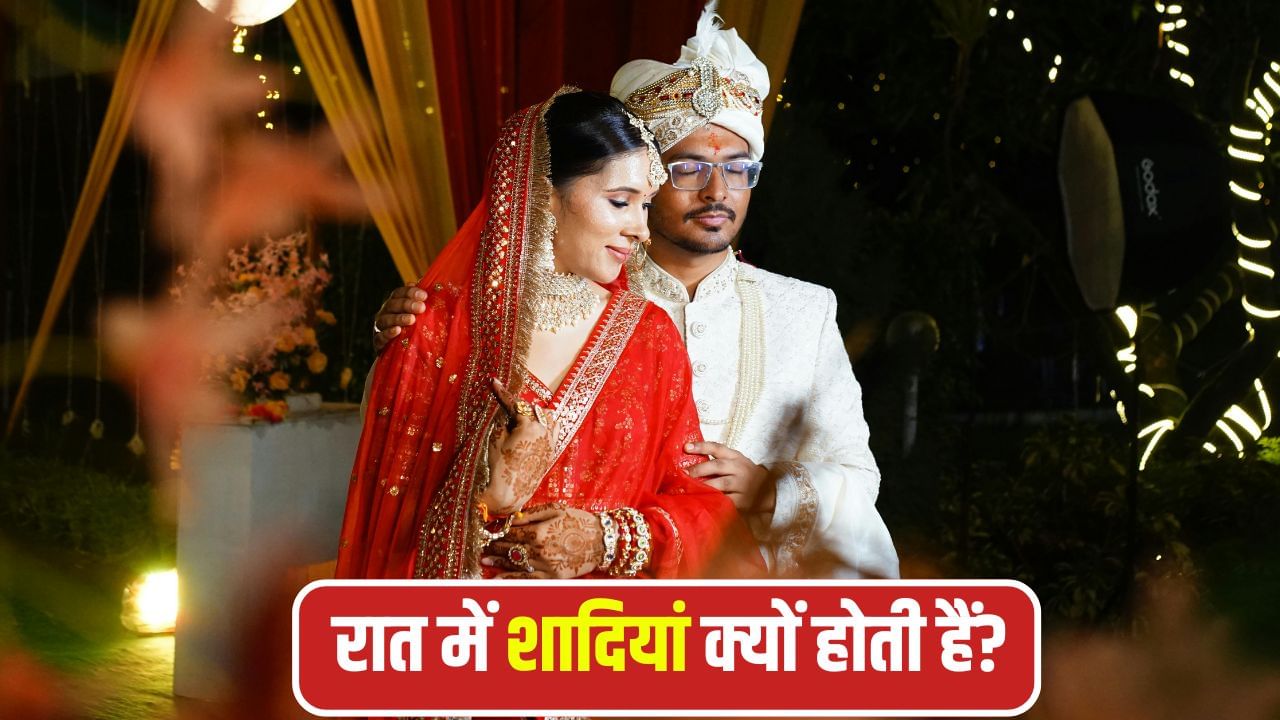Night Marriage tradition: In Indian culture, marriage is considered a sacred sacrament, which is the union of not just two individuals but two families. The most important part of this ritual is the ‘Havan’ or ‘Yagya’, around which the bride and groom take seven rounds. In Hindu religion, Havan is considered an auspicious and source of positive energy, which is considered best to be performed after sunrise and before twilight i.e. during the day.
But, a big contradiction arises here. If religious scriptures give priority to auspicious work and Havan during the day, then most of the people in India, especially North India weddings Why does it happen in the ‘dark of night’ or late at night? Is this an astrological reason, or is there some deep historical mystery hidden behind it? Let us know on the basis of the rules of the scriptures and astrological beliefs.
What the scriptures say: The truth about the ban on ‘Havan at night’
influence of negative forces
In religious texts, night has been described as a period full of darkness. This is the time when negative and demonic powers are considered more active. Because Tantra-Mantra practices often take place at night. Whereas for ordinary householders, the auspicious works related to God including Yagya and Havan are prescribed to be done in the energy of the Sun i.e. in the light of day.
Also read: Know about interesting Gujarati wedding rituals, without which marriage is incomplete.
superiority of brahma muhurta
But many religious scholars are of the opinion that the best time for marriage is Brahma Muhurta or (time of sunset) and not the whole night. However, Brahma Muhurta is considered to be filled with satvik energy, the rituals performed in which are fruitful.
funeral rules
But another important classical rule in Hinduism is that the last rites are not performed after sunset, because due to this the soul of the deceased has to suffer in the next world. When night time is prohibited for an important ceremony like a funeral, the question arises how can it be chosen for the most auspicious ceremony like a marriage? From a purely religious and scriptural point of view, is the time of day or Brahma Muhurta more valid and superior for auspicious functions like Havan and marriage?

Then again, the question is at night weddings Why?
If the scriptures consider daytime marriage auspicious, then where did this tradition of night marriage come from? There are two main reasons behind this.
Astrological Reason: Pole Star and Moon Witness
Witness to the Pole Star: During the wedding ceremonies, the Saptarishi Mandal and the Pole Star are shown to the newly married couple and a promise is made that their relationship will be as steadfast and permanent as the Pole Star. The Pole Star is visible only at night, hence to make it a visible witness of the marriage, the night time was started.
Presence of Moon and Venus: At night, the position of the Moon, a symbol of peace, coolness and love and Venus, the planet responsible for marriage, is more clear and effective. Therefore, according to astrological calculations, the compatibility of these planets makes the marriage more auspicious.
Historical reasons: Mughal terror and social compulsion
This is the reason which historians and many religious leaders consider most responsible for the practice of night marriage in Northern India.
Fear of Mughal invaders: In the medieval period, when the influence of Mughal rulers and invaders increased over the northern parts of India, incidents of looting and kidnapping of women during daytime marriage ceremonies became common. The attackers often attacked the wedding procession and the pavilion.
Safety armor: To avoid these atrocities, Hindu families started performing marriage rituals quietly in the dark of night instead of during the day. In this practice, the main Vedic ceremony of marriage i.e. the rounds were performed in the secret and safe time of the night. Gradually, what was a social compulsion became an established tradition of North India.
Maintaining tradition: Even centuries after the invaders left, this tradition of ‘night marriage’ became so ingrained in the social fabric of North India that it continues even today, even though it is no longer a security threat.
Difference in marriage traditions of South and North India
It is this historical reason that shows us the clear difference between the marriage traditions of North India and South India.
South Indian tradition
In South India (Kerala, Tamil Nadu, Andhra Pradesh, Karnataka) they also follow the ancient rules of the scriptures, where marriages are solemnized in broad daylight, with the Sun as witness. Here, Phere and other main rituals are performed only during the auspicious time of the day, which is called ‘Shubh Muhurta’.
tradition of north india
Whereas in North India (UP, Bihar, Rajasthan, Haryana), night marriage has become an established standard. However, now in the modern society, some families have started marrying during the day for astrological reasons or for convenience, but ‘night marriage’ is still the main cultural identity here.
Effect of time and circumstances
Weddings taking place in the dark, despite the ban on havan at night, is a rare example in Hinduism where social compulsion overruled the classical law. This tradition shows how the harsh conditions of a particular era can permanently change religious and social customs. Today, the debate as to whether a night or day wedding is right may be an old one.
Because from the astrological point of view, witnessing the Pole Star at night is considered auspicious, whereas from the classical point of view, performing Havan in sunlight is more sacred. However, the most important thing is that the marriage should take place at the right ‘auspicious time’ rather than during the day or night. So that the married life of the bride and groom remains happy forever.
Disclaimer: The information given in this news is based on religious beliefs and general information. TV9 Bharatvarsha does not confirm this.
